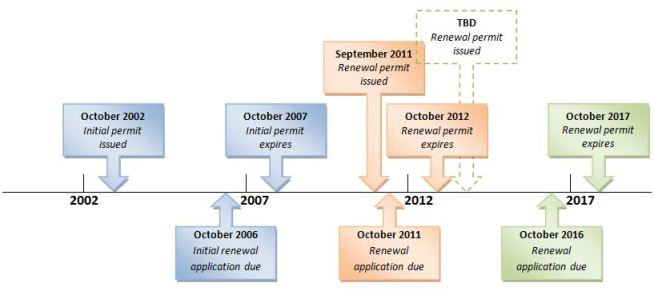Did You Say “Part 70 Source” or “Par 70 Course?”
Posted: October 15th, 2012
Author: All4 Staff
It was around this time last year when I began playing golf. Participating in ALL4’s annual golf outing last October was my third time ever swinging clubs. I’ve been playing regularly ever since (great game, isn’t it?), and I recently caught myself thinking that I had seen “Par 70 course” defined in an air quality regulation. My mind wandered to thoughts of crisp mornings, that perfect tee shot, an occasional birdie…sigh. In a moment of clarity, I realized that there is no logical way to connect golf to an air quality regulation (yet here I am trying!). I quickly verified that the term being defined was “Part 70 source,” not “Par 70 course.” Oh well, back to reality.
So why am I writing about golf in a blog post supposedly about an air quality regulation? Well, it was also around this time last year when I learned of a little nuance about Title V (i.e., Part 70) operating permits. It was a relatively simple concept, yet commonly misunderstood; kind of like how hybrid clubs, despite their appearance, are intended to be hit like irons rather than like a driver. (I can’t tell you how much that revelation improved my game.) Ask anyone how long a Title V permit is effective for and his response will likely be “five years.” That was my understanding, too, until one of my clients received a notification from their permitting agency that their Title V renewal application was due. That may not sound like anything out of the ordinary, except that at the time they received the notification, the facility’s renewal permit from their last Title V renewal application had not yet been issued.
How is that possible, you ask? It is not uncommon for renewal permits to be issued long after the renewal application is submitted and the current permit expires, sometimes even years. That’s why the permit application shield provisions are so important – so that a facility can continue to operate, pursuant to the conditions of the existing permit, even after it expires. In order to be eligible for a permit application shield, the permitted facility must submit a timely and complete renewal application. Title V permit renewal applications can be due anywhere from 18 months to six months prior to expiration, depending on state/local regulatory requirements. For example, another client submitted a timely and complete renewal application in May 2005 for their Title V permit that expired in November 2005. After the permit expired, the facility operated pursuant to the permit application shield provisions until their renewal permit was issued in January 2010, over four years later. That permit now expires in January 2015.

Although Title V permits typically last for five years, 40 CFR Part 70 (the underlying Title V operating permit program) states that Title V permits can be effective “for a term not to exceed five years,” leaving the actual permit’s duration up to the permitting agency’s discretion. Most permitting agencies, like in the example above, issue Title V permits that are effective for five years from the date of issuance, regardless of when that may be. In the case of the first facility, however, their permitting agency issues Title V permits that expire on the same date every five years, regardless of when they are issued.
So here’s what happened: the facility submitted a timely and complete renewal application in October 2006 for their Title V permit that expired in October 2007 (this agency requires renewal applications to be submitted no more than 12 months prior to expiration). The facility operated pursuant to the permit application shield provisions until their renewal permit was issued, in this case until September 2011. But rather than expiring five years from the date of issuance in September 2016, the renewal permit had an expiration date of October 2012 – five years since the previous permit expired, and a mere 27 days before the next renewal application would be due (12 months prior to expiration).
Despite the short timeline, it was extremely important for the facility to qualify for the permit application shield. Without it, the facility would be at risk for operating without a permit unless a renewal permit was issued before October 2012, which was unlikely given the facility’s permitting history. With the application shield at stake (remember, it’s only applicable if a timely and complete renewal application is submitted), the race was on to develop and submit a complete renewal application by October 2011. Through hard work and maintaining a good relationship with the permitting agency, the application was submitted and deemed complete, on time.
A year later now, the renewal permit is about to expire. Whether or not the “second” renewal permit will be issued before the “first” renewal permit expires this month, we’ve learned by now that the “second” renewal permit will expire in October 2017 and that a renewal application will be due in October 2016 (regardless of whether a permit is ever actually issued). But when it comes to Part 70 sources or Par 70 courses, there will always be more to learn about both. ALL4’s annual golf outing is coming up on Friday – maybe I’ll mistake “Par 70 course” for “Part 70 source” – but I doubt it. Let’s just hope there is a 70 in my team’s score!

